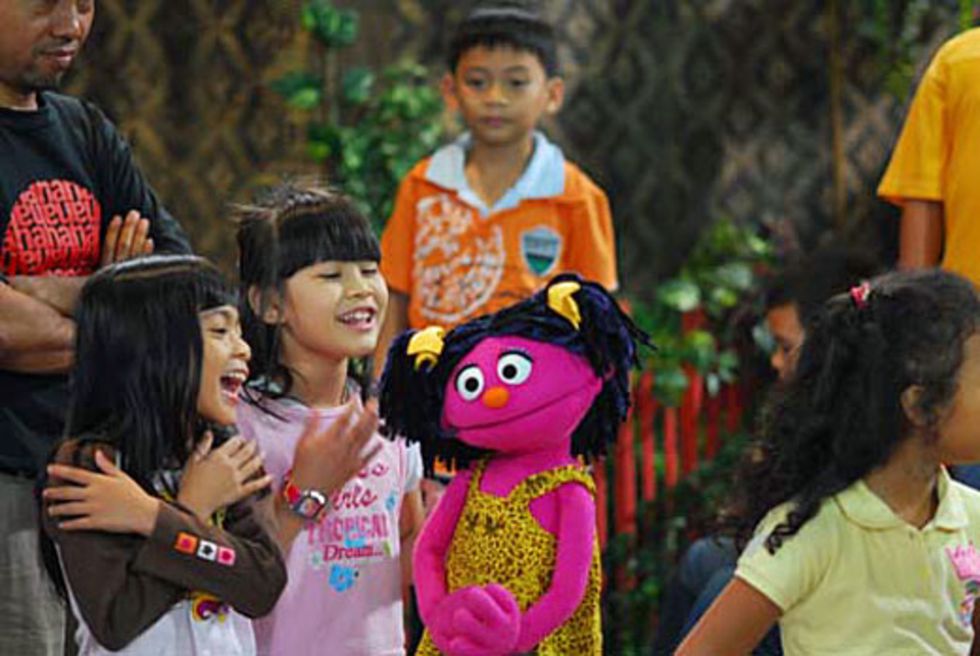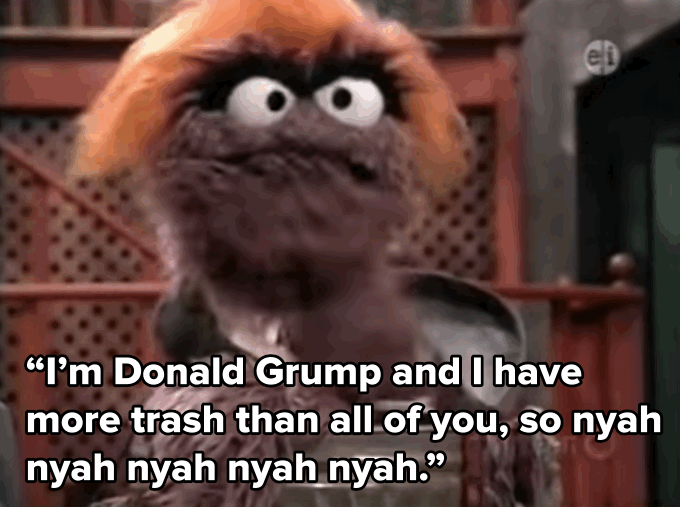Donald Trump's proposed budget, a wish-list of his policies dubbed "America First: A Budget Blue Print to Make America Great Again," is a house of horrors. From eliminating the Minority Business Development Agency to laying off nearly 20 percent of the Environmental Protection Agency and extinguishing all funding for the enactment of the Clean Power Plan, Trump's 2018 America appears bleak. But it is not strictly government agencies that are taking the hit; one further group that will be void from Trump's America is a certain yellow-feathered bird and his cheery comrades.
The Corporation for Public Broadcasting, which federally funds access to public media's educational and informational programming and services (one particularly significant program being PBS' Sesame Street ), would be one of the 20 smaller independent agencies whose funding is eliminated. Naturally, this is far from surprising; Republicans have attempted to eliminate funding for independent agencies such as the Corporation for Public Broadcasting many times over within the past few decades. And, of course, Trump may be especially thrilled to see Sesame Street go for a reason that hits particularly close to home; in the midst of the warmhearted, constructive atmosphere that the show promotes, there is one particular public figure who the show has not-so-subtly mocked for over a decade.
Nonetheless, all presidential grudges aside, if there is one show that truly demands to be saved from the wrath of the 2018 proposed budget, it's Sesame Street. In its 47 years on the air, Sesame Street's sunny days, friendly neighbors and the fuzzy creatures who live on that street where the air is sweet have changed societal approaches to childhood development, education and cultural diversity in a way that no other television program has even bordered upon.
"A vast wasteland." Those were the words FCC Chairman Newton N. Minow used to describe the state of the television landscape of 1961, and television pertaining to children was certainly not exempt. And not five years later, during discussions between television producer Joan Ganz Cooney and Carnegie Foundation vice president Lloyd Morrisett, an idea for a television show that mastered the addictive qualities of television for the greater good was born. Its name? Sesame Street.
Launched at a crucial turning point in thinking among child psychologists and educators –– a time when experts were abandoning the belief that cognitive ability was influenced by early childhood experiences –– Sesame Street immediately proved itself to be revolutionary. In the over 1,000 studies that have been conducted since the show's 1969 debut, every bit of research culminated in the tantamount claim that children who regularly watch Sesame Street surpass nonviewers on tests of letter and number recognition, vocabulary and early math skills. One particularly comprehensive study conducted in 2015 found that young viewers of the show saw a 14 percent drop in their likelihood of being behind in school.
But despite the amount of time the characters spend counting on the show, the far-reaching effects were intended to be about more than just numbers and test scores; it was about two words at the epicenter of the show's DNA: social activism. Arriving at a crossroads in American history, on the heels of 159 race riots across the country, Sesame Street showcased a world where children of all shapes, sizes, creeds and nations could exist, sing songs and learn together. Even in the modern era, the diverse classrooms displayed on Sesame Street are, in many cases, the only diverse classrooms that pre-kindergarteners are acquainted with; A TCF report published in 2015 found that pre-schoolers in state-run programs –– the very group that public children's broadcasting was originally intended to benefit –– tend to be clustered in classrooms with impoverished people of color.
"It was intentional from the beginning to show different races living together," David Kleeman, executive director of the American Center for Children and Media, told Newsweek in 2009. "They were very conscious of the modeling that kids and parents would take away from that."
The hard-hitting topics are far from solely political, and if there's one rule that Sesame Street has abided by, it's that representation matters. While parents today are still fighting for kids with Down syndrome to be represented, “Sesame Street” did it with ease years ago; Jason Kingsley, a boy who debuted on the show when he was about 15 months old, can be seen spending time with his Muppet friends in 55 episodes in the 1970s. Then, in the 90s, Tarah Schaeffer, a girl with osteogenesis imperfecta who uses a wheelchair, sang a song to the tune of “The Wheels on the Bus” to explain the different parts of her wheelchair. In 2016, the show introduced its first Afghan Muppet Zari, a character who promotes girls’ rights. And to top it all of, as of this month, there's a new kid on Sesame Street: Julia, a muppet with Autism. The show's creators consulted with organizations serving families dealing with autism to discuss characteristics to highlight; Julia's first episode will focus on her sensitivity to loud noises, excitability and her reluctance to engage with Big Bird. Julia's puppeteer, Stacey Gordon, has a son with autism, and she wishes that Julia had been around when he and his friends were at a Sesame Street age.
“Had my son’s friends been exposed to his behaviors through something that they had seen on TV before they experienced them in the classroom, they might not have been frightened; [they] would have known that he plays in a different way, and that’s okay,” Gordon told 60 Minutes.
No children's program has made as significant of an attempt to conduct research as Sesame Workshop, nor dedicated as many resources to influence the way our society reasons. If we recognize that effective children's programming changes our society for the better, and if we agree that television cannot return to the "vast wasteland" it was 50 years ago, then Sesame Street is the show worth fighting for.
Anyone and their mother can tell you how to get to Sesame Street; it's a magic carpet ride with every door wide open. It's simple. But in the midst of the looming 2018 budget, we need to make sure that Sesame Street can continue to get to us.




















